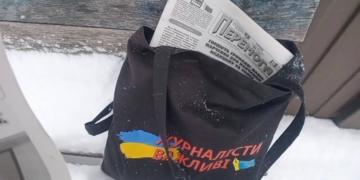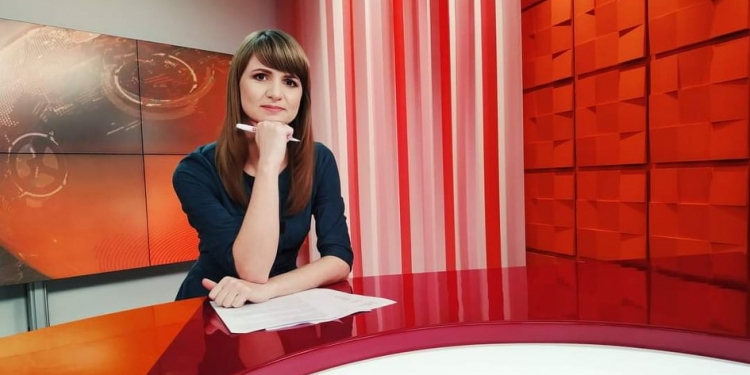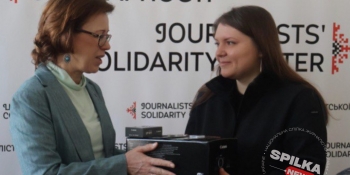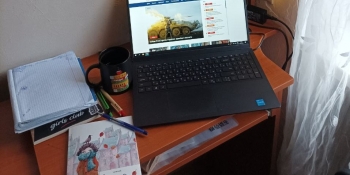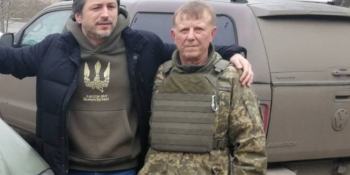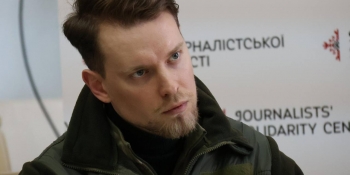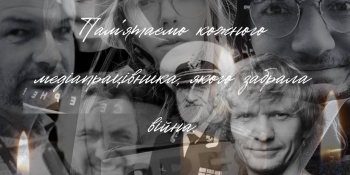44-year-old journalist Nataliya Diedova from Mariupol gave 22 years of her life to local television, eight of them to the Sigma TV channel, where before the war she was the graduate editor of the Dzerkalo [Mirror] news show. And all those 22 years, Nataliya was close to TV cameraman and photographer Viktor Diedov. He worked on the same channel. The happiness of a well-known television family in the city was shattered in an instant: on March 11, Viktor died in front of his wife in their apartment, which was hit by two shells…
On February 24, the couple woke up at about five in the morning. Nataliya got up from the fact that the editorial chat began to go off: colleagues spread news that the war had begun. Meanwhile, Viktor was already watching the news. Real events seemed unreal: the sounds of explosions had not yet reached their area.
At that time, the TV studio began to prepare news programs for the Donbas TV channel, because it was already planned that Sigma and Donbas would be broadcast simultaneously. Meanwhile, from the left bank, relatives of the journalists began to report about the explosions, and a film crew urgently left there.
The next day, February 25, turned out to be the last working day at Sigma for the Diedovs. Premonitions that the entire team gathered for the last time came true. Then began the struggle for personal survival and efforts to at least somehow fulfill professional duties. Some of the employees came to the studio, tried to start the news feed, but periodically the electricity or the Internet went out. Then the TV presenters went to the websites of Sigma and Donbas and to their pages on social media networks. In particular, Diedova wrote about the fact that sirens are not working in the city, about the baking of social bread, about the public transport operation, work of pharmacies, she distributed official messages from local authorities, monologues of the city mayor Vadym Boichenko.
On March 2, electricity, heating, water, and communications disappeared, on March 5, gas supplies stopped. All that remained was faith in negotiations. No one believed that Mariupol would be destroyed, that Mariupol would be ruined in the literal sense of the word – every day, every minute…
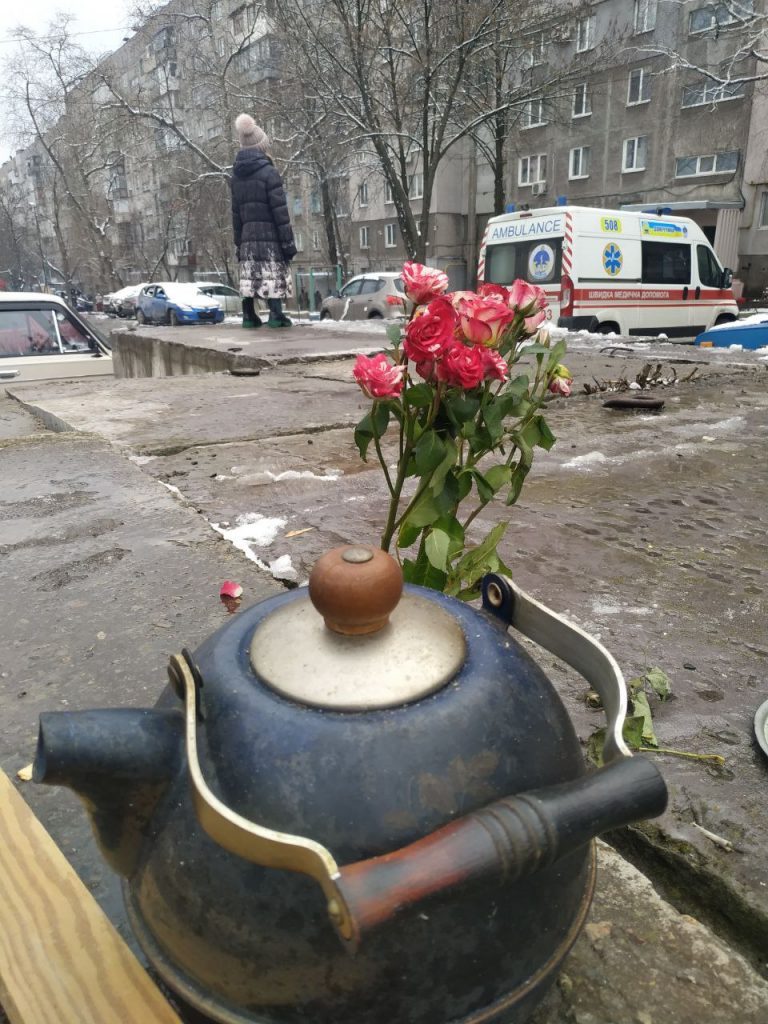
Every day the war tightened the stranglehold around the city. Drinking water was already delivered directly to the yard from the city water supply, technical water had to be drained from the heating system in the basement. Food was cooked on a fire in the yard. Fortunately, the family had food supplies, as well as drinking water.
On March 7, Nataliya came to see a friend who worked in a children’s intensive care unit, and saw a crowd of people trying to save themselves. Some were hiding from shelling, others, wounded, were already being helped. Other public buildings were also used as shelters: the philharmonic hall, the drama theater…
On March 8, Nataliya was again in intensive care. She took the phones of patients, doctors, and other townspeople. She called their relatives, shared information. This was possible, because the Diedovs lived on the 9th floor of the building near the mobile phone tower. Apart from the couple, their 14-year-old son Sashko and two older people, Nataliya’s mother and Viktor’s father, were in the apartment.
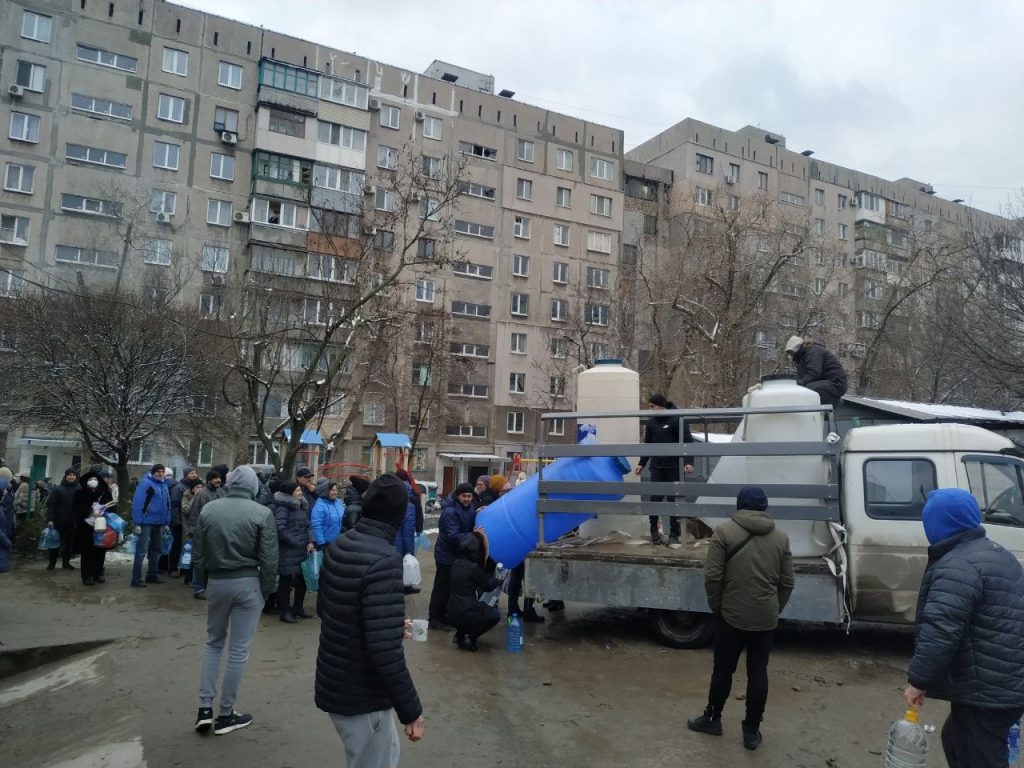
“We heard terrible explosions, the house shook. My husband and I ran downstairs, while Sashko and my mother stayed in the apartment. Outside, they saw that there were no windows left in two neighboring 12-story buildings. We ran to the hospital town nearby, and there we found out that aerial bombs were dropped on the maternity hospital, as well as on the building of the Pryazovske State Technical University in the center of the city. The windows in the intensive care unit were shattered. But the staff saved patients until the last one, until the hospital was destroyed, says Nataliya.
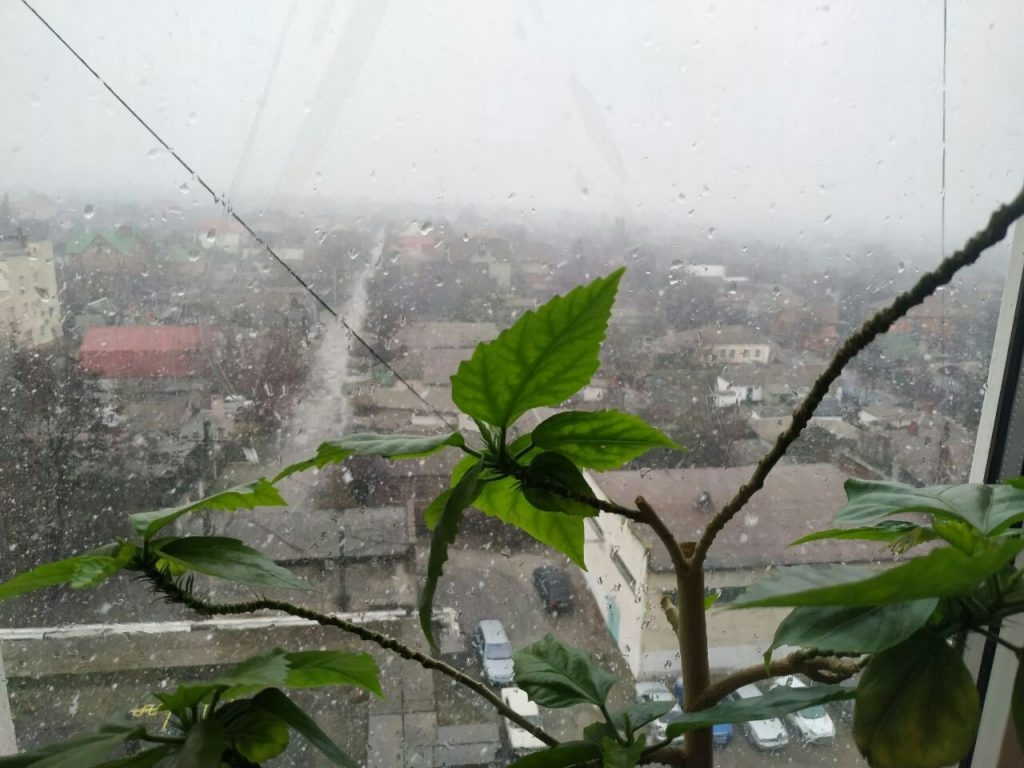
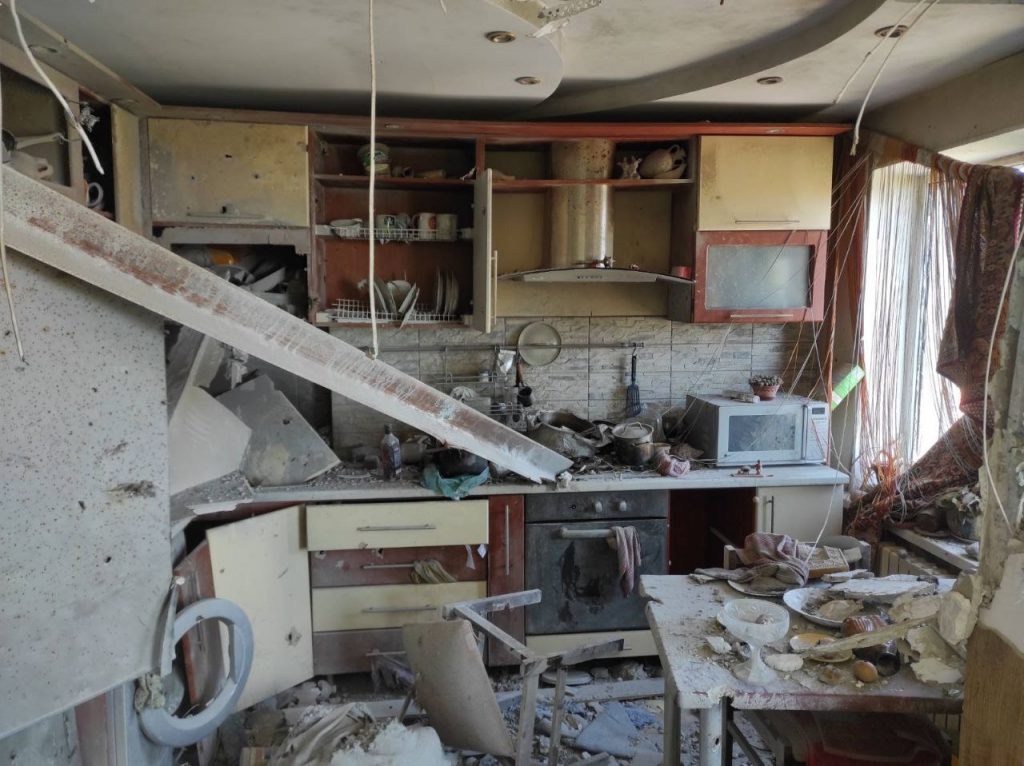
She together with her child spent the night of March 9-10 with their friends – not far away, in a private house. 26 people gathered here, everyone slept where it was possible: Diedovs slept under the big table. But it was impossible to sleep: the woman constantly ran to look from the window at her house: whether the windows in her apartment were intact, because her husband was there with his 86-year-old father and Nataliya’s mother.
Nataliya and her son returned home in the morning, and until March 11, the family did not go anywhere. Meanwhile, there was shooting from all sides outside the walls. The city was burning.

In the kitchen, Nataliya managed to get some food from the balcony and close the door. Then, together with her mother, they covered the window with a carpet in case of a blast wave. And then… the first projectile hit the apartment.
“However, I don’t know for sure what it was – a shell, a mine, or a bomb… My mother and I received head wounds. I screamed, the ceiling started to come down, everything around turned white. It became very difficult to breathe. I grabbed my mother’s hand, we walked through the ruins into the corridor. I shouted three times: “Sasha [the son], where are you?!” He responded three times from the depths of the apartment: “Mom, I’m here!” Sashko grabbed the grandfather, my father-in-law, and Vitia [husband Viktor] was on his way out of the kitchen when he suddenly turned to his son: “I don’t have enough light…”, although the sun was shining through the window. He handed his father a flashlight. And when they were walking together to the corridor, a second projectile flew into the apartment. 10 seconds passed between the two hits… The son managed to rush out of the apartment. In this confusion in the corridor, I tripped over my father-in-law – he was lying under Viktor. But I didn’t see Vitia at that moment, I didn’t see anything in the corridor – I just grabbed my mother-in-law, took her to the elevator, sat her on a chair. Then I start to understand that I can’t see my husband… he is gone. I don’t understand: how come he is not here when he had been with me for 22 years?! I ran into the apartment and saw my husband lying motionless. I shouted: “Vitia, Vitia!!!”. But there was such a dead silence… I will remember this silence for the rest of my life. And I still don’t understand how to live without him,” says the widowed woman with despair.
Nataliya never managed to say goodbye to Viktor. In the following days, the woman tried to get into the apartment under fire, but the door was jammed shut. To the two men who tried to help her, with axes and crowbars, she was shouting: “I want to say goodbye! Please do something for me to come in!..” Unfortunately, they could not…
It was definitely impossible to stay at home back then. The family first took refuge with the same neighbors, then hid from shelling in a basement of a high-rise building for three days. In the morning of March 16, naval artillery was heard, and it was more terrible than all the previously experienced horror.
On the same day, the Diedovs managed to leave the city. Nataliya worried most about her son, because in the event of her death, he would remain an orphan.
In the shelling-ruined Mariupol, Nataliya took a lot of photos and videos on her smartphone. Filmed a broken maternity home, filmed how her house was burning, filmed horrified and depressed people in a drama theater… But when they left the city, most of the files had to be deleted. If the occupiers had discovered them on the way, it would have meant immediate death. It was possible to preserve more or less content-neutral shots: city streets, cooking in the yard; as well as everything related to her deceased husband. And many more photos remained on a carefully hidden hard drive.
On March 17, the Diedovs got to the occupied territory near Melitopol, where they were forced to stay for two weeks. Here Nataliya watched Russian TV channels and was impressed by their way of covering the information about the events she saw with her own eyes.
From the occupation, Nataliya Diedova managed to call fellow countryman Mykola Osychenko, the president of the MTV channel (Mariupol Television). On his advice, she destroyed her journalist’s credentials for security reasons, and then left for the free territory, Zaporizhzhia.
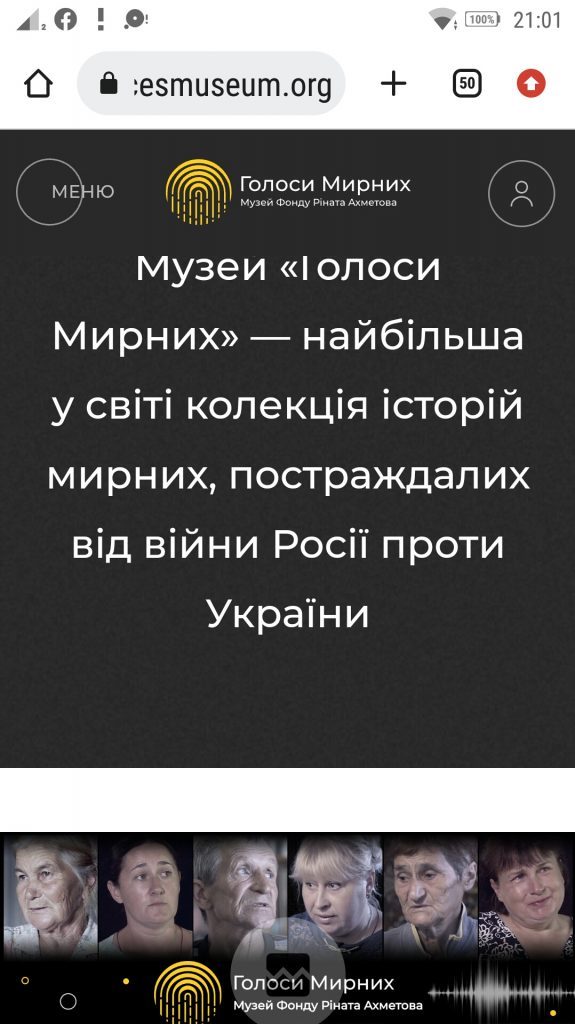
A few days later, Osychenko invited her to record remote video interviews with Mariupol residents who had experienced situations similar to hers, for the Rinat Akhmetov Foundation’s project entitled Civilians’ Voices (civilvoicesmuseum.org). Nataliya agreed. Firstly, it is her professional mission. Secondly, it enhanced the efforts to save oneself psychologically.
Escape from the occupation was not the last test: in October, in Zaporizhzhia, the family again survived a rocket attack on the boarding house where they temporarily lived. Mad fear again… After this blow, they left for Kyiv.
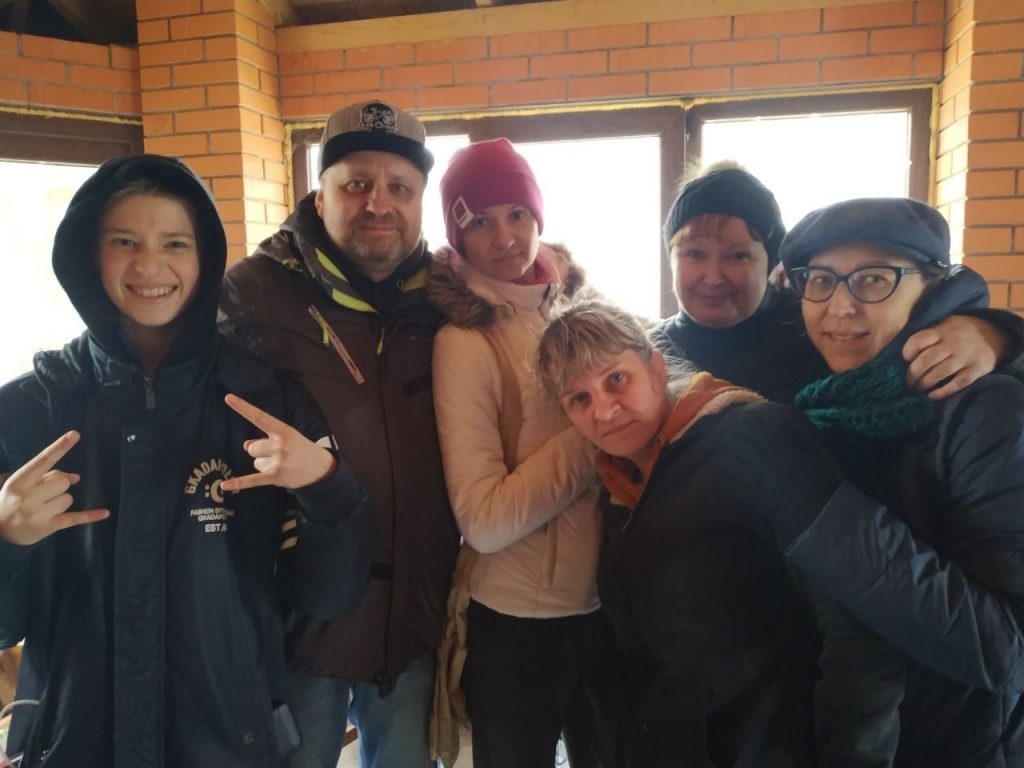
Even more than by the opinion of ordinary townspeople is Nataliya shocked by the behavior of some former colleagues:
“My husband had taught many willing people the profession of a TV cameraman. One of his students was Viktor Zubenko. He now claims that he was being killed by the AFU [Armed Forces of Ukraine]… He says so, because instead of the destroyed apartment, he was given another one – in a new building. We don’t talk to him anymore, but it’s very painful for me. It hurts when colleagues who now work at the occupied Mariupol 24 channel say: “Natasha, we are out of politics.” I don’t understand why my colleague Sasha Buzuluk is now telling in an interview that the Ukrainian army allegedly visited the MTV channel in the spring, and because of that everything was destroyed and burned there. These people simply do not exist for me anymore. But, unfortunately, they exist there and tell the local people THAT type of the truth. And those people believe SUCH truth very easily, because they have no other as Ukrainian news is impossible there. More than 130,000 Mariupol residents were killed in March and April! The number of those unrecognized among the killed is about 30,000! And that’s why we will continue to write these stories so that the world knows the truth, so that everyone who wants to tell the story of survival in Mariupol’s hell is heard.
JOURNALISTS ARE IMPORTANT. Stories of Life and Work in Conditions of War is a series of materials prepared by the team of the National Union of Journalists of Ukraine (NUJU) with the support of the Swedish human rights organization Civil Rights Defenders.





